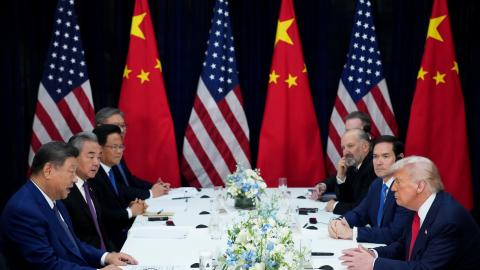On October 30, Presidents Xi Jinping and Donald Trump held their first in-person meeting since 2019. During their 100-minute encounter at the Republic of Korea’s Gimhae Air Base outside Busan, they made some progress de-escalating commercial issues, as detailed in a White House Fact Sheet. However, neither side fundamentally changed its position on these or other issues. The agreements reached in Busan are politically but not legally binding. They provide few safeguards against a renewed cycle of escalatory retaliations.
Resolving many of these economic disputes requires addressing their security connections. Yet, Xi and Trump eschewed discussing most of the non-economic topics dividing their countries. These deferred issues included nuclear arms control and proliferation, the Korean situation, cyber issues beyond semiconductors, and Taiwan. We need to await next year’s reciprocal presidential visits for authoritative decisions on these questions.
Trump reportedly raised Beijing’s support for Moscow’s war against Ukraine. U.S. officials believe that the PRC could strain Russia’s military-industrial complex by curtailing hydrocarbon imports, technology exports, and other transactions that have helped Russia overcome Western sanctions. But persuading Beijing to change policies regarding Ukraine is challenging. China receives substantial benefits from the Russia-Ukraine war, which distracts the West from confronting the PRC in Asia and generates a large market for PRC investments and exports, without incurring substantial costs.
In any case, Putin’s commitment to conquering Ukraine seems inexorable. The Russian government still insists on the same war aims as it did before Moscow launched its invasion, despite the enormous human, economic, and other costs of the conflict. Without Chinese aid, Russia’s military effort would weaken. But even if Xi called Putin tomorrow and demanded that the Kremlin end the war or lose China’s assistance, Putin would likely fight on until “victory” or he leaves office.
The presidents skirted important security issues entirely. Immediately before meeting Xi, Trump posted on his Truth Social account that the United States would resume nuclear weapons testing. The post probably reflected Trump’s vexation at Putin’s nuclear threats, but also reminded Xi of the need for Sino-American arms talks. U.S. officials want Beijing to understand that China’s nuclear buildup and rejection of arms control with Washington are driving the United States to test its existing nuclear weapons and develop new ones.
Trump’s inability to secure a meeting with North Korean leader Kim Jong Un was not a major setback. Washington’s leverage over Pyongyang remains minimal and a rushed meeting would likely have yielded little. Even so, Trump’s highlighting interest in engaging with Kim could help dissuade Pyongyang from taking actions that might antagonize the U.S. president, such as detonating another nuclear weapon.
However, angst is growing in Washington that the PRC is relaxing its opposition to the North Korean nuclear program. In the past, China-U.S. cooperation to end the program and keep the Korean Peninsula free of weapons of mass destruction was a foundational pillar of Sino-American collaboration. If China joins Russia in legitimizing the DPRK nuclear arsenal, the prospects of further nuclear proliferation throughout the world will increase, to the detriment of China, the United States, and many other nations.
Trump and Xi also did not discuss Afghanistan, despite Sino-U.S. tensions over Trump’s desire to restore the Bagram Air Base, the fighting between Afghan and Pakistani forces, and the potential for Afghan-related instability to disrupt Chinese and U.S. efforts to connect Central Asian governments better with global markets. Trump’s hosting all five Central Asian leaders at a White House dinner the week after he returned from his largely successful week-long trip to Asia suggests a combined discussion of Afghan-Central Asian issues should be addressed during next year’s Sino-American leadership engagements.
The narrow Busan dialogue on chip export controls could profitably expand to address additional Sino-U.S. cyber issues. For example, both governments now routinely accuse the other of cyber-enabled espionage. Furthermore, the inherent dual-use nature of AI means the PRC and U.S. governments will invariably consider its security as well as economic implications. Discussing safeguards against AI-related crime and standards to limit the risks of AI-controlled weapons.
The most explosive unresolved Sino-U.S. security issue, though, remains the Taiwan question. Trump said that Beijing would not invade Taiwan during his presidency due to Xi’s respect for him and fear of U.S. power. Asians’ fear that Moscow’s invasion of Ukraine would embolden Beijing to use force in Asia has also declined over time. Yet, the Taiwan issue looms as the most likely cause of a Sino-American great power war. Trump has returned to the pre-Biden U.S. policy of ambiguity regarding whether the United States would intervene militarily to help defend Taiwan from a PRC invasion.
On the one hand, U.S. Secretary of State Marco Rubio made a speech before the trip to dispel concerns that Trump would trade away Taiwan’s security for PRC trade concessions. Indeed, Trump has not uttered the words Beijing wants to hear: that the United States “opposes” (vice “does not support”) Taiwan’s independence. But the administration has reduced the volume of arms sales, lowered the seniority of the bilateral defense talks, and not permitted the Taiwanese president to transit through U.S. territory. Perhaps Trump wanted to avoid discussing Taiwan at Busan to preserve ambiguity, but the issue will continue to challenge their interactions.
The trajectory of Sino-U.S. economic relations is fraught with problems. Among all major U.S. commercial partners, China is better positioned to contest a trade war due to the size of its economy, control over critical rare earth elements, and other advantages. The PRC continues to pursue “asymmetric decoupling,” aiming to decrease reliance on other countries while increasing their dependence on China. Meanwhile, the United States is demanding foreign investment primarily to enhance its long-term self-reliance.




















